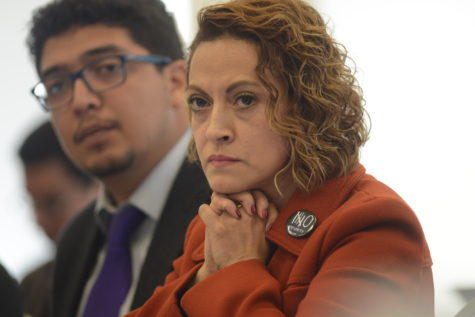
Credit: CIDH via Flickr
The Inter-American Court of Human Rights (IACtHR) will, for the first time, address States’ obligations to prevent gender-based violence against female journalists in conflict zones, in the case of Jineth Bedoya Lima, a Colombian journalist who was kidnapped, tortured, and raped despite the State’s prior knowledge of threats against her due to her work as a journalist. [IACHR Press Release; CEJIL (Spanish only)] On July 16, 2019, the Inter-American Commission on Human Rights (IACHR) presented Bedoya Lima’s case to the Court because Colombia has so far failed to implement the IACHR’s recommendations in its merits report, which was issued in January 2019. [IACHR Press Release; CEJIL] The IACHR’s decision to refer the case to the Court marks the latest step in Bedoya Lima’s fight against impunity, and presents an opportunity for the Court to develop its jurisprudence on States’ obligations related to sexual violence against female journalists and restrictions on press freedom. [IACHR Press Release; CEJIL] The merits report is not yet available online.
Case Summary & Background
In May 2000, while working on an investigative report regarding the deaths of inmates in a national prison that resulted from fighting between paramilitary and criminal groups, Bedoya Lima was abducted outside of the prison, tortured and raped. [IACHR Press Release; FLIP (Spanish only)] Several times, Bedoya Lima reported to authorities that had been subjected to “constant threats and attacks against her life and personal integrity” because of her work as a journalist. [IACHR Press Release]
Jineth Bedoya Lima first submitted a petition to the IACHR in 2011. See IACHR, Admissibility Report No. 50/14, Petition 779-11, Jineth Bedoya Lima (Colombia), 21 July 2014. The IACHR issued an admissibility report in July 2014 and later held a hearing on the case in 2016. In January 2019, the IACHR reportedly adopted its merits report, finding the State responsible for violating a number of Bedoya Lima’s rights in its failure to protect her even while being aware of multiple threats against her. [IACHR Press Release; CEJIL] According to a press release from the IACHR Special Rapporteur for Freedom of Expression, the IACHR noted specifically that, in the context of the high level of sexual violence against women during Colombia’s internal armed conflict, the State had “a special obligation” to ensure her safety. [IACHR Press Release] Thus, the IACHR recognized “the State’s special duties to protect women journalists,” and assessed the case in light of the “differentiated forms of violence and discrimination” committed against female journalists. [IACHR Press Release]
The IACHR concluded that the State did not act with due diligence to protect Bedoya Lima’s rights to life, liberty, private life, equal protection, security of person, and freedom of expression as a journalist given that the State did not investigate the threats nor identify who was sending them. [IACHR Press Release]
Additionally, the Commission found that the State violated Bedoya Lima’s rights to judicial protection and due process by failing to conduct an adequate investigation into the acts of violence against her. [IACHR Press Release] The IACHR noted that the State’s failure to meet established international standards for the investigation of cases of sexual violence also led to her re-victimization and violated her mother’s right to personal integrity. [IACHR Press Release]
In its merits report, the IACHR issued various recommendations to the State, including that it conduct an impartial and thorough investigation of the case, taking seriously the possibility of involvement of State agents. [IACHR Press Release] The IACHR noted that this was necessary to guarantee the future safety and wellbeing of Bedoya Lima and her family. [IACHR Press Release] The IACHR emphasized the need for guarantees of non-repetition centered around measures that would ensure the safety of all female journalists in Colombia through the training of officials and awareness-raising projects around issues of gender-based violence. [IACHR Press Release] The IACHR also recommended that the State pay compensation for both material and immaterial losses suffered. [IACHR Press Release]
Referral to the Inter-American Court
The IACHR issues a merits report after it evaluates the allegations made in a petition and determines whether there were any human rights violations. When the IACHR concludes that the facts of the case constitute human rights violations, the merits report includes recommendations to the State. The IACHR may refer cases to the Court when the State does not comply with the recommendations in the IACHR’s merits report, provided that the State has accepted the Court’s jurisdiction. Otherwise, the IACHR publishes the merits report. See IACHR, Rules of Procedure of the Inter-American Court of Human Rights (2009), arts. 44, 45.
Domestic Proceedings
Domestically, in 2012, the Colombian Attorney General’s office declared the crimes committed against Bedoya Lima to be crimes against humanity. [Knight Center] To date, only four people have been sentenced in her case. Most recently, on May 7, 2019, a court in Bogotá sentenced two former paramilitary fighters for their roles in the violence committed against Bedoya Lima. [CPJ: Bedoya] The court’s decision noted that third parties may be liable for the crimes that took place in this case, including a former Colombian police official. [CPJ: Bedoya] Previously, in February and March 2016, two former paramilitary fighters were sentenced for their roles in the crimes against Bedoya Lima. [CPJ: Sentences] Bedoya Lima herself has noted that according to her own investigations and information from the prosecutor’s office, at least 27 people, including State agents, were allegedly implicated in the crimes committed against her. [Knight Center]
Additional Information
For more information on the Inter-American system and the human rights of women, visit IJRC’s Online Resource Hub. To stay up-to-date on international human rights news, visit IJRC’s News Room or subscribe to the IJRC Daily.
